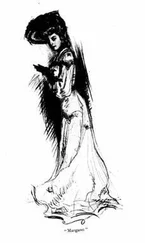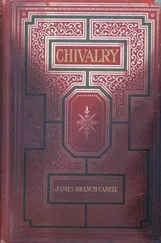James Cabell - The Rivet in Grandfather's Neck. A Comedy of Limitations
Здесь есть возможность читать онлайн «James Cabell - The Rivet in Grandfather's Neck. A Comedy of Limitations» весь текст электронной книги совершенно бесплатно (целиком полную версию без сокращений). В некоторых случаях можно слушать аудио, скачать через торрент в формате fb2 и присутствует краткое содержание. Жанр: Фэнтези, на английском языке. Описание произведения, (предисловие) а так же отзывы посетителей доступны на портале библиотеки ЛибКат.
- Название:The Rivet in Grandfather's Neck. A Comedy of Limitations
- Автор:
- Жанр:
- Год:неизвестен
- ISBN:нет данных
- Рейтинг книги:3 / 5. Голосов: 1
-
Избранное:Добавить в избранное
- Отзывы:
-
Ваша оценка:
- 60
- 1
- 2
- 3
- 4
- 5
The Rivet in Grandfather's Neck. A Comedy of Limitations: краткое содержание, описание и аннотация
Предлагаем к чтению аннотацию, описание, краткое содержание или предисловие (зависит от того, что написал сам автор книги «The Rivet in Grandfather's Neck. A Comedy of Limitations»). Если вы не нашли необходимую информацию о книге — напишите в комментариях, мы постараемся отыскать её.
The Rivet in Grandfather's Neck. A Comedy of Limitations — читать онлайн бесплатно полную книгу (весь текст) целиком
Ниже представлен текст книги, разбитый по страницам. Система сохранения места последней прочитанной страницы, позволяет с удобством читать онлайн бесплатно книгу «The Rivet in Grandfather's Neck. A Comedy of Limitations», без необходимости каждый раз заново искать на чём Вы остановились. Поставьте закладку, и сможете в любой момент перейти на страницу, на которой закончили чтение.
Интервал:
Закладка:
"You are like your grandfather, sir, at times," the latter said, inconsequently enough, when the colonel had finished.
And Rudolph Musgrave gave a little bowing gesture, with an entire gravity. He knew it was the highest tribute that Stapylton could pay to any man.
"She's a daughter any father might be proud of," said the banker, also. He removed his cigar from his mouth and looked at it critically. "She's rather like her mother sometimes," he said carelessly. "Her mother made a runaway match, you may remember—Damn' poor cigar, this. But no, you wouldn't, I reckon. I had branched out into cotton then and had a little place just outside of Chiswick—"
So that, all in all, Colonel Musgrave returned homeward not entirely dissatisfied.
VII
The colonel sat for a long while before his fire that night. The room seemed less comfortable than he had ever known it. So many of his books and pictures and other furnishings had been already carried to Matocton that the walls were a little bare. Also there was a formidable pile of bills upon the table by him,—from contractors and upholsterers and furniture-houses, and so on, who had been concerned in the late renovation of Matocton,—the heralds of a host he hardly saw his way to dealing with.
He had flung away a deal of money that evening, with something which to him was dearer. Had you attempted to condole with him he would not have understood you.
"But what would you have had a gentleman do, sir?" Colonel Musgrave would have said, in real perplexity.
Besides, it was, in fact, not sorrow that he felt, rather it was contentment, when he remembered the girl's present happiness; and what alone depressed the colonel's courtly affability toward the universe at large was the queer, horrible new sense of being somehow out of touch with yesterday's so comfortable world, of being out-moded, of being almost old.
"Eh, well!" he said; "I am of a certain age undoubtedly."
By an odd turn the colonel thought of how his friends of his own class and generation had honestly admired the after-dinner speech which he had made that evening. And he smiled, but very tenderly, because they were all men and women whom he loved.
"The most of us have known each other for a long while. The most of us, in fact, are of a certain age…. I think no people ever met the sorry problem that we faced. For we were born the masters of a leisured, ordered world; and by a tragic quirk of destiny were thrust into a quite new planet, where we were for a while the inferiors, and after that just the competitors of yesterday's slaves.
"We couldn't meet the new conditions. Oh, for the love of heaven, let us be frank, and confess that we have not met them as things practical go. We hadn't the training for it. A man who has not been taught to swim may rationally be excused for preferring to sit upon the bank; and should he elect to ornament his idleness with protestations that he is self-evidently an excellent swimmer, because once upon a time his progenitors were the only people in the world who had the slightest conception of how to perform a natatorial masterpiece, the thing is simply human nature. Talking chokes nobody, worse luck.
"And yet we haven't done so badly. For the most part we have sat upon the bank our whole lives long. We have produced nothing—after all—which was absolutely earth-staggering; and we have talked a deal of clap-trap. But meanwhile we have at least enhanced the comeliness of our particular sand-bar. We have lived a courteous and tranquil and independent life thereon, just as our fathers taught us. It may be—in the final outcome of things—that will be found an even finer pursuit than the old one of producing Presidents.
"Besides, we have produced ourselves. We have been gentlefolk in spite of all, we have been true even in our iniquities to the traditions of our race. No, I cannot assert that these traditions always square with ethics or even with the Decalogue, for we have added a very complex Eleventh Commandment concerning honor. And for the rest, we have defiantly embroidered life, and indomitably we have converted the commonest happening of life into a comely thing. We have been artists if not artizans."
There was upon the table a large photograph in sepia of Patricia Stapylton. He studied this now. She was very beautiful, he thought.
"'Nor thou detain her vesture's hem'—" said the colonel aloud. "Oh, that infernal Yankee understood, even though he was born in Boston!" And this as coming from a Musgrave of Matocton, may fairly be considered as a sweeping tribute to the author of Give All to Love .
Colonel Musgrave was intent upon the portrait…. So! she had chosen at last between himself and this young fellow, a workman born of workmen, who went about the world building bridges and canals and tunnels and such, in those far countries which were to Colonel Musgrave just so many gray or pink or fawn-colored splotches on the map. It seemed to Colonel Musgrave almost an allegory.
So Colonel Musgrave filled a glass with the famed Lafayette madeira of Matocton, and solemnly drank yet another toast. He loved to do, as you already know, that which was colorful.
"To this new South," he said. "To this new South that has not any longer need of me or of my kind.
"To this new South! She does not gaze unwillingly, nor too complacently, upon old years, and dares concede that but with loss of manliness may any man encroach upon the heritage of a dog or of a trotting-horse, and consider the exploits of an ancestor to guarantee an innate and personal excellence.
"For to her all former glory is less a jewel than a touchstone, and with her portion of it daily she appraises her own doing, and without vain speech. And her high past she values now, in chief, as fit foundation of that edifice whereon she labors day by day, and with augmenting strokes."
And yet—"It may be he will serve you better. But, oh, it isn't possible that he should love you more than I," said Colonel Musgrave of Matocton.
The man was destined to remember that utterance—and, with the recollection, to laugh not altogether in either scorn or merriment.
PART FOUR - APPRECIATION
"You have chosen; and I cry content thereto,
And cry your pardon also, and am reproved
In that I took you for a woman I loved
Odd centuries ago, and would undo
That curious error. Nay, your eyes are blue,
Your speech is gracious, but you are not she,
And I am older—and changed how utterly!—
I am no longer I, you are not you.
"Time, destined as we thought but to befriend
And guerdon love like ours, finds you beset
With joys and griefs I neither share nor mend
Who am a stranger; and we two are met
Nor wholly glad nor sorry; and the end
Of too much laughter is a faint regret."
R.E. TOWNSEND. Sonnets for Elena.I
Next morning Rudolph Musgrave found the world no longer an impassioned place, but simply a familiar habitation,—no longer the wrestling-ground of big emotions, indeed, but undoubtedly a spot, whatever were its other pretensions to praise, wherein one was at home. He breakfasted on ham and eggs, in a state of tolerable equanimity; and mildly wondered at himself for doing it.
The colonel was deep in a heraldic design and was whistling through his teeth when Patricia came into the Library. He looked up, with the outlines of a frown vanishing like pencilings under the india-rubber of professional courtesy,—for he was denoting or at the moment, which is fussy work, as it consists exclusively of dots.
Then his chair scraped audibly upon the floor as he pushed it from him. It occurred to Rudolph Musgrave after an interval that he was still half-way between sitting and standing, and that his mouth was open….
Читать дальшеИнтервал:
Закладка:
Похожие книги на «The Rivet in Grandfather's Neck. A Comedy of Limitations»
Представляем Вашему вниманию похожие книги на «The Rivet in Grandfather's Neck. A Comedy of Limitations» списком для выбора. Мы отобрали схожую по названию и смыслу литературу в надежде предоставить читателям больше вариантов отыскать новые, интересные, ещё непрочитанные произведения.
Обсуждение, отзывы о книге «The Rivet in Grandfather's Neck. A Comedy of Limitations» и просто собственные мнения читателей. Оставьте ваши комментарии, напишите, что Вы думаете о произведении, его смысле или главных героях. Укажите что конкретно понравилось, а что нет, и почему Вы так считаете.



